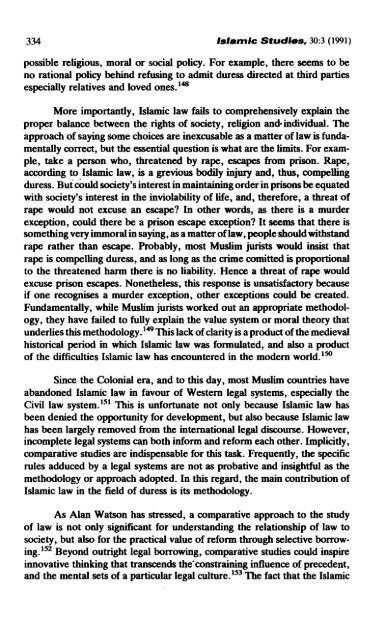LAW OF DURESS IN ISLAMIC LAW AND COMMON LAW: A ...
LAW OF DURESS IN ISLAMIC LAW AND COMMON LAW: A ...
LAW OF DURESS IN ISLAMIC LAW AND COMMON LAW: A ...
You also want an ePaper? Increase the reach of your titles
YUMPU automatically turns print PDFs into web optimized ePapers that Google loves.
334 Islamic Studies, 30:3 (1991)<br />
possible religious, moral or social policy. For example, there seems to be<br />
no rational policy behind refusing to admit duress directed at third parties<br />
especially relatives and loved ones.'48<br />
More importantly, Islamic law fails to comprehensively explain the<br />
proper balance between the rights of society, religion and*individual. The<br />
approach of saying some choices are inexcusable as a matter of law is fundamentally<br />
correct, but the essential question is what are the limits. For example,<br />
take a person who, threatened by rape, escapes from prison. Rape,<br />
according to Islamic law, is a grevious bodily injury and, thus, compelling<br />
duress. ~utcbuld society's interest in maintaining order in prisons be equated<br />
with society's interest in the inviolability of life, and, therefore, a threat of<br />
rape would not excuse an escape? In other words, as there is a murder<br />
exception, could there be a prison escape exception? It seems that there is<br />
something very immoral in saying, as a matter of law, people should withstand<br />
rape rather than escape. Probably, most Muslim jurists would insist that<br />
rape is compelling duress, and as long as the crime annitted is proportional<br />
to the threatened harm there is no liability. Hence a threat of rape would<br />
excuse prison escapes. Nonetheless, this response is unsatisfactory because<br />
if one recognises a murder exception, other exceptions could be created.<br />
Fundamentally, while Muslim jurists worked out an appropriate methodology,<br />
they have failed to fully explain the value system or moral theory that<br />
underlies this meth~dology.'~~ This lack of clarity is a product of the medieval<br />
historical period in which Islamic law was formulated, and also a product<br />
of the difficulties Islamic law has encountered in the modem w~rld.'~<br />
Since the Colonial era, and to this day, most Muslim countries have<br />
abandoned Islamic law in favour of Western legal systems, especially the<br />
Civil law system.''' This is unfortunate not only because Islamic law has<br />
been denied the opportunity for development, but also because Islamic law<br />
has been largely removed from the international legal discourse. However,<br />
incomplete legal systems can both inform and reform each other. Implicitly,<br />
comparative studies are indispensable for this task. Frequently, the specific<br />
rules adduced by a legal systems are not as probative and insightful as the<br />
methodology or approach adopted. In this regard, the main contribution of<br />
Islamic law in the field of duress is its methodology.<br />
As Alan Watson has stressed, a comparative approach to the study<br />
of law is not only significant for understanding the relationship of law to<br />
society, but also for the practical value of reform through selective borrowing.'"<br />
Beyond outright legal borrowing, comparative studies could inspire<br />
innovative thinking that transcends the'constraining influence of precedent,<br />
and the mental sets of a particular legal cult~re.''~ The fact that the Islamic
















